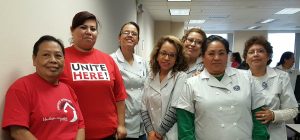Yolanda Baron Carmona, 52, and Maria Rodriguez, 46, are celebrating a victory for California’s hotel housekeepers. The state’s Occupational Safety & Health Standards Board approved a new regulation on January 18 to address the ergonomic hazards faced by the 100,000 hotel housekeepers employed in California.

The victory was the culmination of a decade long effort. Those efforts included research collaborations with housekeepers and public health scientists, and a 2012 rulemaking petition filed with the Board by UNITE Here Local 11 and UNITE Here International Union.
The rule will require lodging establishments to identify and address hazards that put housekeepers at risk of musculoskeletal injuries. These include back injuries and cumulative trauma disorders involving muscles, tendons, ligaments and bones.
Housekeepers face a variety of ergonomic hazards, from repetitive, extreme reaching (think about cleaning bathroom mirrors and bathtub walls); and whole body exertion, and torso bending and twisting (think about lifting mattresses to make beds), to excessive work speed and inadequate recovery time (think about cleaning 14-20 rooms per shift).
Over the last six years while California’s OSH Standards Board was considering the proposed rule, 150 housekeepers provided testimony about their working conditions. At a 2014 hearing in Oakland, CA, Fabiola Benavidez testified about cleaning 14 rooms per day and trying to push heavily loaded carts down very long carpeted hallways.
“…it is very hard to push the carts over carpeted floor. …Management does not ask about what kind of tools or carts we need. They buy whatever they want. They are not the ones who work in the rooms. They are not the ones who push the carts. Last month they bought new carts that are terrible which made it hard to remove the back of the carts to pull linens.”
She said that management should ask them what they need.
Silvia Medrano testified about working at the St. Francis Drake Hotel in San Francisco. The transcript from the hearing reads:
“She said that after the hotel was renovated, full size beds were replaced with queen size beds. She noted that they cannot make the bed because between the bed and the wall and the dresser there is not even 6 inches. Because it is so difficult to make the bed, many coworkers are injured.”
Stevenson Collins, a houseman at a Courtyard Marriot in Oakland, said housekeepers there have about 15 rooms to clean per day.
“He noticed that they do not have the long-handled mops to clean the floors, which would make their jobs easier, so they wouldn’t have to clean floors on their knees or with shorter handled tools.”
Among the many topics raised by the workers was fitted sheets. The majority of hotels insist on using flat bed sheets, but changing them requires housekeepers to lift each mattress multiple times to achieve the tight fit demanded by management. Having fitted versus flat sheets is not an insignificant matter. Luxury and memory foam mattresses weigh more than 100 pounds.
In 2015, the Philadelphia Inquirer’s Jane M. Von Bergen asked a hotel CEO about fitted and flat bed sheets. Jay Shah, the CEO of Hersha Hospitality Trust, said that fitted sheets take too long to iron and the elastic wears out. This new California rule should help protect housekeepers from wearing out.
“Hotel housekeepers are the invisible backbone of the hospitality industry. Overwhelmingly women, immigrants, and people of color, housekeepers face high rates of workplace injury. The state of California has recognized the seriousness of the dangers housekeepers face and took an important step to protect these workers,” said Pamela Vossenas, DrPHc, MPH and director of worker safety and health for UNITE HERE, the hospitality workers union.
The “Hotel Housekeeping Musculoskeletal Injury Prevention Standard” (CalOSHA new Section 3345) rule has a number of provisions for housekeeper to be involved with the new requirements. Housekeepers will receive special training, and have the right to be informed and involved in identifying ergonomic hazards and evaluating remedies to address them.
California OSHA (Cal/OSHA) already has a requirement for all employers in the state to implement a workplace injury and illness prevention program. Hotel employers will have the option of integrating the musculoskeletal injury prevention requirements into that program.
The California Hotel and Lodging Association (CHLA) opposed the new protections for housekeepers. CHLA argued the rule would be redundant and unworkable. The state’s OSH Standards Board meticulously responded to every one of CHLA’s objections. They approved the new rule by a vote of 5-0. The final step is a review by an administrative law judge.
